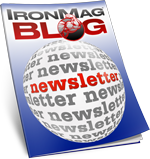
Age is an important factor that determines the amount of testosterone circulating in men’s bodies, but it’s not the only one. American army researchers discovered that stress and fatigue may be just as important factors. It could be the case that men’s testosterone levels rise if they reduce their stress levels and make sure they are well rested.
Study
Researchers at the Naval Health Research Center in San Diego measured the testosterone levels of 57 men in an elite unit. They recorded the men’s BMI, sleep, stress, fatigue and blood pressure using questionnaires and basic measurements.

Results
Age was an important predictor of testosterone levels, which were highest in the soldiers aged 28-31. After that their testosterone levels plummeted.

The fatigue that the soldiers reported also played a role. The higher the soldiers scored their tiredness, the lower their testosterone level.

The same was true for stress. The more stress the men experienced, the lower their testosterone level.
High scores for stress and fatigue had a similar correlation with low testosterone levels as age did. This study revealed that BMI and sleep did not play a significant role.
The figure below shows the correlation between testosterone, stress, fatigue, age, BMI and sleep. The closer a correlation is to 1 or -1, the stronger the relationship.

Conclusion
More stress and more fatigue go together with less testosterone. The researchers suspect that in the first instance stress reduces the testosterone level, and that fatigue is then a result of the lower testosterone level. But they don’t know for sure. It may be the case that fatigue also lowers testosterone levels.
Anabolic hormone profiles in elite military men: Robust associations with age, stress, and fatigue
Highlights
• We evaluated anabolic hormones and biobehavioral health in elite military men.
• Robust linear associations were observed between testosterone and perceived stress.
• Lower dehydroepiandrosterone and testosterone associated with higher fatigue.
• Routine monitoring of anabolic hormones is important in stressed populations.
Abstract
We recently established stable daily profiles of the anabolic hormones dehydroepiandrosterone (DHEA) and testosterone in 57 elite military men. In this follow-on study, we explored associations of salivary anabolic hormone profiles with demographic (i.e., age, body mass index [BMI]) and biobehavioral health indices (i.e., blood pressure, sleep, perceived stress, fatigue) via correlational models. Next, nuanced patterns were constructed using quartile splits followed by one-way analysis of variance and post hoc subgroup comparisons. Both DHEA (r range: −0.33 to −0.49) and testosterone (r range: −0.19 to −0.41) were inversely associated with age. Quartile comparisons revealed that age-related declines in DHEA were linear, curvilinear, or sigmoidal, depending on the summary parameter of interest. Anabolic hormone profiles did not associate with BMI, blood pressure, or sleep efficiency. Robust linear associations were observed between testosterone and perceived stress (r range: −0.29 to −0.36); concentration-dependent patterns were less discernible. Lower DHEA (r range: −0.22 to −0.30) and testosterone (r range: −0.22 to −0.36) concentrations associated with higher fatigue. Subsequent quartile comparisons suggested a concentration-dependent threshold with respect to evening testosterone. Specifically, those individuals within the lowest quartile (≤68.4 pg/mL) endorsed the highest fatigue of the four groups (p = 0.01), while the remaining three groups did not differ from each other. This study not only showed that anabolic hormone profiles have distinctive age trajectories, but are also valuable predictors of stress and fatigue in elite military men. This highlights the importance of routine monitoring of anabolic hormone profiles to sustain and optimize health and readiness in chronically stressed populations.
Source: http://www.sciencedirect.com/science/article/pii/S0039128X17300806?via%3Dihub


 Unsubscribe at anytime, no spam & we do not sell your info!
Unsubscribe at anytime, no spam & we do not sell your info!